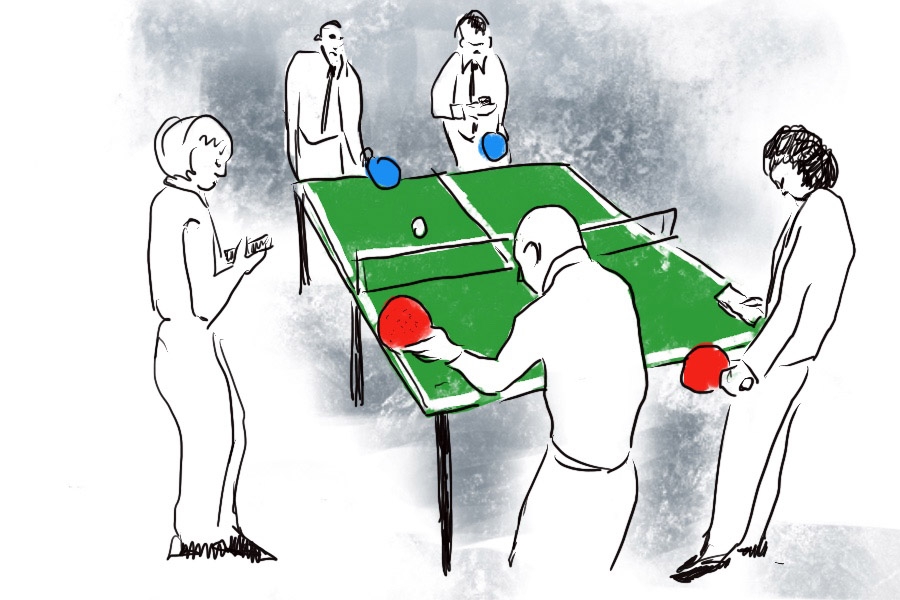What really works in keeping employees happy in their jobs.
It’s been reported that there has been a drop in the sale of pingpong tables in Silicon Valley. A recent article on Quartz reported this large drop and then went on to ponder whether this trend was an indicator as to the state of Silicon Valley.
The feeling shared by a number of observers is that the main reason ping-pong table sales are down is that the Silicon Valley startup bubble is about to burst. They feel that companies are reigning in spending to weather a financial storm, perhaps in preparation for another tech collapse. But I think it’s an indication of something else altogether.
I think it’s more an acknowledgement that providing pingpong tables (along with the myriad of other perks) just doesn’t work when it comes to keeping people engaged. Pingpong tables (and I’m using the term as an icon for all the “perks” that many companies offer) will never overcome or compensate for poor, ineffective or overbearing leaders.
If a company – any company – hires properly, the new employees are already highly engaged. You don’t need to “do” anything to them to get them engaged. They’re enthused about being there and are dreaming of ways to make a difference in their new role.
Pingpong tables will do very little to augment their level of engagement. The issue isn’t how to get them engaged. Instead, it’s how to keep them from becoming disillusioned and disengaged. People don’t become disengaged because of a lack of pingpong. They become disengaged by the words and actions of poor leaders. And no amount of pingpong, free food or onsite laundry will ever make up for that.
RELATED STORY: THE THREE SECRETS TO ENGAGEMENT
The 2013 survey on engagement conducted by Gallup confirms this. Over the past 13 years, the overall level of engagement in the U.S. has remained flat. It’s remained flat because most companies have taken a misguided approach to improving engagement. Engagement isn’t something you do to employees. Instead the key to improving engagement is to avoid (or at least minimize) the disengagement that occurs when leaders treat people poorly.
While there are many factors which contribute to effective leadership, the three that have the greatest positive effect on people and on engagement are treating people like people, treating adults like adults and showing sincere appreciation.
Treat people like people instead of like things
People aren’t “resources” to be managed, used and discarded. Effective leaders understand that everyone – regardless of title or position – has hopes and dreams, fears and stress, and successes and failures.
Effective leaders are empathetic to others and believe that most people want to do a good job. Interestingly enough, this approach allows a leader to hold people accountable to a higher degree, which leads to better results.
Treat adults like adults instead of like children
When a leader reprimands someone, he or she treats them like a child. When a leader micromanages people, he or she is treating them like children. When a leader doesn’t trust his or her team to follow through and act responsibly, he or she is treating them as children.
Treating adults like adults and as professionals means communicating clearly and then holding them accountable for results. An effective leader grants autonomy after establishing clear expectations. People appreciate being trusted and will generally exceed expectations when given the opportunity.
RELATED STORY: FIVE STRATEGIES FOR BECOMING AN INSPIRATIONAL LEADER
Show sincere appreciation
Appreciation is generally shown in response to the effort someone makes rather than for an accomplishment. Recognition is typically offered as a reward and acknowledgement for accomplishments. Sincere appreciation is generally spontaneous and heartfelt, given from one person to another.
When we let people know we appreciate their efforts, it communicates that we’re grateful for their efforts, and that we respect and value them. The impact of showing appreciation is immediate and long lasting. When a person’s efforts and sacrifices are sincerely appreciated, self-esteem rises, engagement rises and loyalty rises.
So while having pingpong tables may be the cool thing to do, it does little to further the success of a business. Instead invest in helping leaders excel at bringing out the best in people.
Michael Beck is a Portland-based executive coach, business strategist and author of leadership book, “Eliciting Excellence.”








